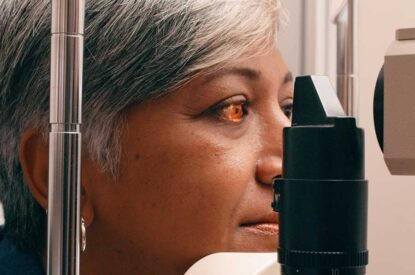
Understanding Glaucoma
Are you looking to learn more about glaucoma? Have you been diagnosed with this complex eye disease, or do you care about someone who could lose vision to glaucoma? If your answer is “yes,” there are a few things you should know.
What Is Glaucoma?
Glaucoma is an eye disease that gradually deteriorates your vision by causing damage to the optic nerve. Glaucoma usually has no symptoms in its early stages and without proper treatment, glaucoma can lead to blindness. The good news is that with regular eye exams, early detection, and treatment, you can preserve your sight.
If you have been diagnosed with glaucoma, or you suspect you have glaucoma, you probably have a lot of questions or concerns. Coping with a long-term eye condition can seem overwhelming. We seek to empower you by helping you learn how to preserve your vision and live a normal life with glaucoma.
Am I at Risk for Glaucoma?
Anyone can get glaucoma, but some people are at higher risk than others. If you are over the age of 60, are of African, Asian, or Hispanic descent, have relatives with glaucoma, have high eye pressure, or have had an eye injury, you are at greater risk of developing glaucoma.
What Are Common Glaucoma Symptoms?
Glaucoma symptoms vary by the type of glaucoma. The most common type of glaucoma (open-angle glaucoma) often has no uncomfortable or painful symptoms other than gradual vision loss that can go unnoticed for years.
- By the time a person is aware of vision loss, the disease is usually quite advanced.
- Because glaucoma has few warning signs or symptoms in its early stages, it is important to see a doctor for regular eye exams.
- If glaucoma is detected, your eye doctor can prescribe treatment to help protect your vision.
Angle-closure glaucoma, although less common, is a medical emergency and its symptoms include:
- Hazy or blurred vision
- Severe eye and head pain
- Nausea or vomiting (accompanying severe eye pain)
- Appearance of rainbow-colored circles around bright lights
- Sudden sight loss
What Causes Glaucoma?
Glaucoma is a chronic eye disease that develops when the optic nerve becomes damaged. As this nerve and its axons gradually deteriorate, blind spots develop in your vision. Although we don’t have all the answers for what causes glaucoma yet, risk factors include:
- Elevated eye pressure (intraocular pressure)
- Large optic nerve (or thinning of the optic nerve)
- Closed drainage angle of the eye
- Thin cornea
- Family history of glaucoma
- African, Hispanic, or Asian descent
Glaucoma can also be caused by a secondary factor such as trauma, another illness, or certain medications.
What are the Different Types of Glaucoma?
The two main types of glaucoma are open-angle glaucoma and angle-closure glaucoma. Most other types of glaucoma are variations of these, including normal-tension glaucoma, pigmentary glaucoma, congenital glaucoma, exfoliative glaucoma, neovascular glaucoma, uveitic glaucoma, traumatic glaucoma, and secondary glaucoma. What most types of glaucoma have in common is an increase of intraocular pressure (IOP), or pressure inside the eye.
How Do I Get Tested for Glaucoma?
To test for glaucoma, visit an eye doctor for a complete eye exam that includes five common, painless tests to detect glaucoma. Regular eye exams are essential because most people don’t experience any symptoms or early warning signs. The doctor will check your eye pressure, examine your optic nerve (dilated eye exam), test your field of vision, measure the thickness of your cornea, and examine the angle in your eye where the iris meets the cornea.
How Do I Treat Glaucoma?
Fortunately, effective glaucoma treatments are now available. From eye drop medications to laser treatments to surgery, these solutions control eye pressure, the main cause of vision loss in glaucoma. New approaches are continuously being developed and evaluated.
Who Gets Glaucoma?
Today, more than 3 million people in America have glaucoma. About half of them don’t know it. The good news? Your eye doctor can test for glaucoma, even if you have no symptoms. And with regular eye exams, early detection, and proper care, you can preserve your sight. Learn about living with glaucoma.
Can I Live Normally With Glaucoma?
Working closely with their doctor, the vast majority of people living with glaucoma will retain their vision. To give your eyes their best chance, Glaucoma Research Foundation offers a wide range of resources for patients and caregivers, from a medication guide, to tips on working with your doctor, to information on financial assistance that can make eye care more affordable.
Is There a Cure for Glaucoma?
Currently, there is no cure for glaucoma — however, we want you to know that researchers are working hard everyday to find a cure. Preventing glaucoma, slowing its progression, restoring lost vision, reversing a disease that can steal sight — this is our mission. The progress we make every day, with leading scientists as our partners and support from people who share our cause, is bringing us closer to a future free from glaucoma, for everyone.
Latest Glaucoma Research
Glaucoma Research Foundation is dedicated to scientific glaucoma research that deepens our understanding of glaucoma, generates new treatments, and will ultimately cure a disease that is the second leading cause of blindness. Recently, scientists have made discoveries that could protect or regrow retinal ganglion cells and axons damaged by glaucoma. Learn about promising research advances that are leading the way for new therapies and bringing us closer to a cure.
Learn More


